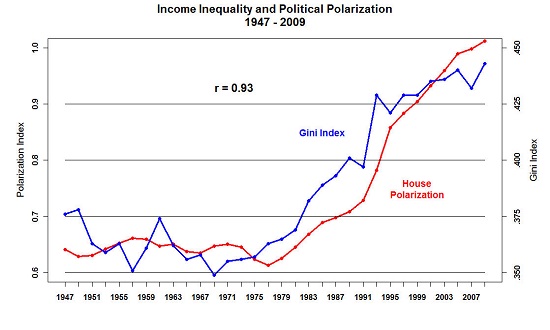As a society, we are ill-prepared for the end of "politics is the solution."
It's fun to be a politician when there's plenty of tax revenues and borrowed money to distribute, and when the goodies get bipartisan support. An economy that's expanding all household incomes more or less equally is fun, fun, fun for politicians because more household income generates more income tax revenues and more spending that generates other taxes.
Despite the usual ideological squabbles, the general mood is upbeat: the horse-trading is about the relative share of the spoils each constituency will receive. Nobody gets everything they want, but everybody gets a good chunk and after an appropriate period of whining, resentment and indignation eventually counts their blessings.
But once the pie starts shrinking, the mood darkens: rather than goodies being distributed, losses and belt-tightening must be distributed. The game is now zero-sum: one constituency's gain is another's dead loss.
Politics is no longer fun once the pie starts shrinking. The illusion of "growth" can be maintained for a while by borrowing enormous sums and distributing the windfall as if it were real, organic growth but eventually the wheels fall off the substitute debt for income and tax revenues game and the entire rotten structure collapses.
The other dynamic in play that's visible in the chart below is the distribution of wealth and power is so asymmetric that it's destroying politics as a "solution."Financialization, neoliberalism and its handmaiden globalization have skewed income, wealth and power to the very top of the distribution pyramid: the rich are getting richer, and the super-rich are getting super-richer--and more politically powerful as a result.
But the asymmetry isn't driven solely by the perversities of neoliberalism / financialization: beneath the surface, the economy is shifting in fundamentally dramatic ways that exacerbate wealth-income distribution asymmetries: there are fewer winners and more losers.
These forces have polarized politics into two camps: one with an ideological faith that markets left to themselves will sort it all out to everyone's satisfaction and the other camp with an ideological faith that the central state is the only solution via redistribution of income.
As I've explained here many times and in my many books, both are wrong:neither the market nor the state can maintain the status quo in an era of DeGrowth and tectonic shifts in demographics, natural resources, energy, technology, etc.
Humans being humans, the failure of politics as a "solution" only hardens the ideological resolve of each camp, insuring even more bitter partisanship and more zealotry, as neither side is willing to admit that both "solutions" are wanting, as both "solutions" only work in periods of rapid growth that generates more goodies for everyone.
That era ended a decade ago, and the illusion of growth has been generated by the temporary artifice of debt and money-creation.
As a society, we are ill-prepared for the end of "politics is the solution." No wonder being a politician is no longer fun.
NOTE: Contributions/subscriptions are acknowledged in the order received. Your name and email remain confidential and will not be given to any other individual, company or agency.
| |
Thank you, Cooper K. ($10/month), for your outrageously generous subscription to this site-- I am greatly honored by your support and readership.
| |




























